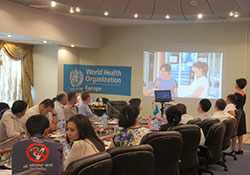Key issues of anti-tobacco policy implementation discussed in Uzbekistan

WHO
On 31 May 2017, Uzbekistan affirmed the theme of this year’s World No Tobacco Day – “Tobacco: a threat to development” – with an intersectoral meeting to address anti-tobacco policy implementation.
Representatives of the ministries of economy, justice and health; the State Committee on Competition and Entrepreneurship; the Chamber of Commerce and Industry; the national television and radio company; and leading nongovernmental organizations (NGOs) all met to focus on this issue.
“Achieving several Sustainable Development Goals (SDGs) closely relates to reducing tobacco use,” said Dr Lianne Kuppens, WHO Representative and Head of the Country Office in Uzbekistan, in her opening speech. SDG 3.4 is focused on reducing premature deaths from 4 groups of noncommunicable diseases by 2030. To achieve this, the country is working to decrease tobacco use by 10% and to ensure 100% tobacco-free public places by 2030.
Dr Zulkhumor Mutalova, Director of the Public Health Institute, confirmed that enhancing health promotion to strengthen country development is a key priority of the Government of Uzbekistan.
During the meeting, WHO experts presented estimates of the impact of tobacco use on country development. They also pointed out missed opportunities to enforce measures recommended by the WHO Framework Convention on Tobacco Control.
Representatives of NGOs from the Kashkadarya and Fergana regions shared their experiences and the obstacles they encountered during the introduction of comprehensive anti-tobacco measures under the umbrella of the “Establishing a tobacco-free environment” campaign in April–May 2017.
Based on these experiences and lessons learned, participants discussed the current situation regarding the introduction of anti-tobacco policy, the challenges of establishing tobacco-free environments, the illegal trade of tobacco products, and marketing and sponsorship. They also explored strategies for strengthening the role and active involvement of mass media, civil society and NGOs in establishing sustainable mechanisms of public control to protect the population from tobacco.
Participants proposed the establishment of an intersectoral technical working group and the development of an action plan for combating tobacco use in Uzbekistan.



